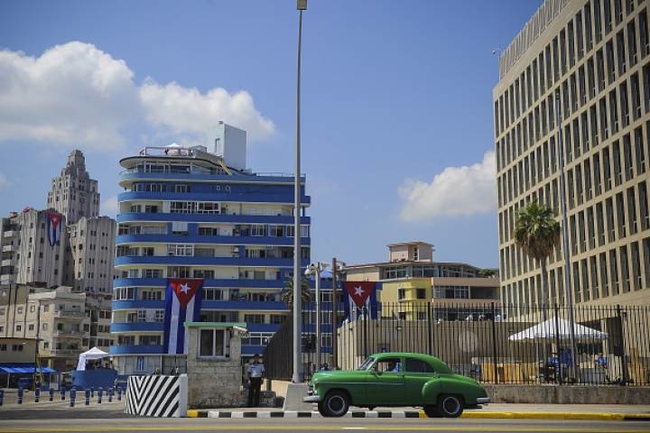U.S. makes cuts to embassy staff in Havana official
Granma | Monday, 5 March 2018 | Click here for original article

A wire from Associated Press highlights that the announcement makes the U.S. decision last year to withdraw 60 percent of its diplomats from its embassy in Cuba, under the pretext of supposed “sonic attacks” against its personnel, practically permanent
From March 5, the United States Embassy in Havana will operate as an “unaccompanied post,” according to an official media note from the U.S. Department of State, published March 2.
The document explains that “The U.S. Embassy in Havana has operated under ordered departure status since September 29, 2017, due to health attacks affecting U.S. Embassy Havana employees. It will reach the maximum allowable days in departure status on March 4.”
Meanwhile, a wire from Associated Press highlights that the announcement makes the U.S. decision last year to withdraw 60 percent of its diplomats from its embassy in Cuba, under the pretext of supposed “sonic attacks” against its personnel, practically permanent.
However, after months of investigations by Cuban and U.S. authorities, no evidence explaining the cause or origin of the alleged health issues suffered by U.S. diplomats has been found.
AP adds that by law, the State department can only order diplomats to leave temporarily for six months before either sending them back or making the reductions permanent.
Meanwhile, the State Department noted that “The embassy will continue to operate with the minimum personnel necessary to perform core diplomatic and consular functions.”
This is exactly how the Embassy has been functioning since September 2017, when the U.S. government withdrew the majority of its staff, paralyzing consular services for Cubans and only maintaining core diplomatic services and functions relating to emergencies.
The measure comes amidst growing calls from different sectors in the U.S. to normalize operations at both embassies and rescind travel warnings to Cuba.
A bicameral delegation of U.S. Congresspeople which visited the island last week described the withdrawal of diplomatic personnel as “a mistake,” noting that the decision affects people on both sides of the Florida Straits and puts collaboration initiatives between both countries since December 17, 2014, at risk.
Meanwhile, On March 1, around twenty tour operators demanded that Washington eliminate travel alerts regarding Cuba, noting that the island is recognized as one of the safest destinations for international travelers by specialist tour agencies and international bodies.
STATE DEPARTMENT RECEIVES HARSH CRITICISM
The U.S government’s decision to permanently cut staff at its embassy in Havana was immediately met with criticism.
Congress woman Barbara Lee tweeted: “This decision from the State Department undermines years of progress towards normalising relations with #Cuba. Our diplomats should be allowed to do their jobs & return to their posts in Cuba.”
Meanwhile, in a statement James Williams, President of the bipartisan coalition Engage Cuba working to end the U.S. blockade against the island, said that “It is deeply disappointing that Secretary Tillerson chose not to return U.S. diplomats to their assigned posts in Havana.
“Perhaps the biggest losers will be the hundreds of thousands of Cubans and Cuban Americans, who travel back and forth to see family, celebrate milestones, and attend to sick relatives, since we are unable to properly process visas and facilitate travel,” noted Williams, adding that “We implore Secretary Tillerson not to abandon the Cuban people during this critical time.”






